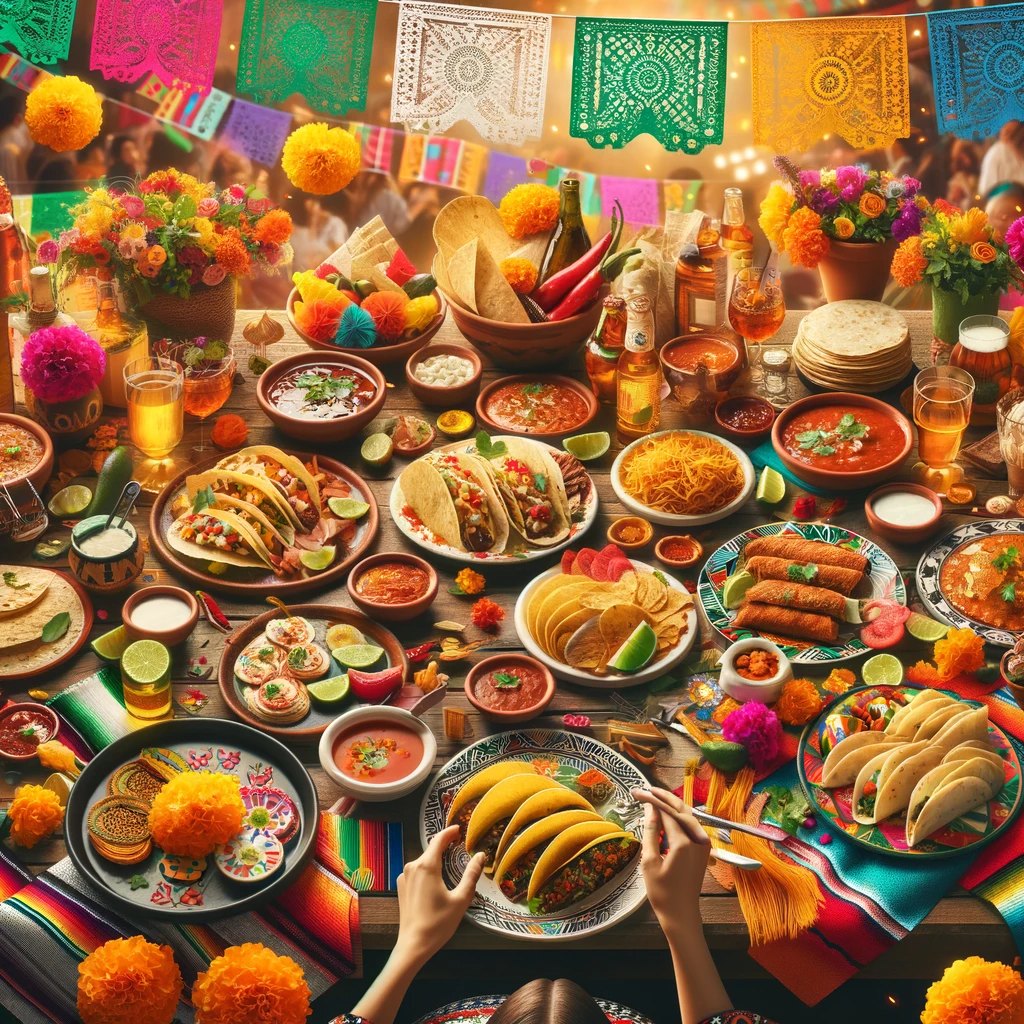Celebrating Mexican Heritage through Gastronomy
Mexican cuisine, a vibrant tapestry of flavors, colors, and traditions, stands as a profound expression of cultural identity and heritage. This gastronomic legacy, deeply rooted in history and community, transcends mere sustenance to become a cornerstone of celebration and connection among the Mexican people and beyond.
The Essence of Mexican Gastronomy
Mexican food culture is an intricate blend of ancestral practices, agricultural methods, and communal customs. The Michoacán paradigm, recognized by UNESCO as an Intangible Cultural Heritage of Humanity, exemplifies this rich cultural model. It encompasses traditional farming techniques like milpas and chinampas, culinary processes such as nixtamalization, and the use of native ingredients like corn, beans, and chili peppers.
The Three Sisters: Corn, Beans, and Squash
These staple crops, known as the “three sisters,” have been the foundation of Mexican diet and agriculture for centuries. They represent the agricultural wisdom of the indigenous people and their ability to create a harmonious blend of flavors and nutrition.
Regional Diversity in Mexican Cuisine
Mexican cuisine is not monolithic; it varies significantly across regions. Northern states like Chihuahua and Sonora offer dishes influenced by ranching culture, while the Yucatan Peninsula is known for its unique flavors, such as those found in cochinita pibil.
The Role of Tacos in Mexican Culture
Tacos, a ubiquitous element of Mexican cuisine, illustrate the fusion of indigenous and Spanish influences. The evolution of tacos over time reflects the adaptability of Mexican culinary traditions while maintaining their cultural significance.
Tacos as a Cultural Symbol
In every region of Mexico, tacos take on different forms, from the beef tacos of the north to the fish tacos of coastal areas. They are a testament to the regional diversity and the shared cultural heritage of the nation.
The Global Influence of Mexican Cuisine
Mexican chefs have become cultural ambassadors, showcasing the exclusivity and quality of local produce. The professionalization of Mexican cuisine has led to its recognition as haute cuisine worldwide, with Mexican restaurants featuring prominently in international culinary rankings.
Mexican Cuisine in the United States
The Latino population in the U.S. has enriched the American culinary landscape with a pan-Latino cuisine that affirms cultural identity. Cities like Los Angeles celebrate Mexican gastronomy, blending local ingredients with traditional Mexican flavors.
Festivals and Food: A Celebration of Heritage
Mexican festivals are incomplete without the inclusion of traditional foods. Celebrations like La Fiesta Grande De Enero and the Day of the Dead feature dishes that are integral to the cultural festivities and the preservation of heritage.
The Day of the Dead and Mexican Cuisine
Corn-based offerings like tortillas and tamales are central to the Day of the Dead rituals, symbolizing the connection between food and the spiritual world.
The Importance of Traditional Cuisine for Sustainable Development
The collective efforts in states like Michoacán highlight the role of traditional cuisine in reinforcing community identity and promoting sustainable development. Female collectives play a crucial role in preserving and passing down culinary knowledge and techniques.
The Culinary Legacy of Mexican Food
Mexican cuisine’s historical and cultural significance is evident in its continued popularity and influence on global gastronomy. The legacy of Mexican culinary traditions is celebrated in modern cuisine through fusion dishes and the global spread of Mexican-inspired flavors.
Preserving Hispanic Heritage Through Cuisine
Culinary experiences serve as a bridge to understanding and appreciating Latin cultural nuances. Chefs and culinary experts use food to tell cultural stories and preserve traditions, fostering a sense of belonging and cultural pride.
The Professionalization of Mexican Cuisine
The last two decades have seen a significant shift in Mexican gastronomy, with the rise of culinary schools and a focus on professionalization. This has led to a domino effect, elevating the standards of Mexican cuisine and its producers.
The Role of Chefs in Cultural Preservation
Mexican chefs are committed to teaching future generations about traditional farming and cooking practices. They emphasize the responsibility of preserving and improving Mexican cuisine for the benefit of all.
Mexican Food: A Culinary Journey
The origins of Mexican food trace back to the ancient Aztec and Mayan cultures, with the Spanish conquest introducing new ingredients and culinary techniques. This fusion has created a unique and beloved culinary legacy that continues to evolve.
The Historical Background of Iconic Mexican Dishes
Traditional recipes and preparation methods reflect the rich heritage behind iconic Mexican dishes. The cultural significance of food in Mexican traditions is evident in every bite.
FAQs: Celebrating Mexican Heritage through Gastronomy
What makes Mexican cuisine unique?
Mexican cuisine is unique due to its blend of indigenous, Spanish, African, and Asian influences, creating a rich diversity of flavors and techniques that reflect the country’s complex history and cultural identity.
How do Mexican festivals incorporate traditional cuisine?
Mexican festivals often feature specific dishes that are symbolic and integral to the celebration, such as tamales during the Day of the Dead, which serve as offerings to honor the deceased.
Why are tacos considered a staple in Mexican culture?
Tacos are a staple in Mexican culture because they are versatile, accessible, and embody the fusion of indigenous and European culinary traditions. They are a symbol of Mexican identity and are enjoyed in various forms across the country.
How has Mexican cuisine influenced global gastronomy?
Mexican cuisine has influenced global gastronomy by introducing bold flavors and unique ingredients to the world. Its popularity has led to the rise of fusion cuisine and the incorporation of Mexican-inspired dishes in international restaurants.






